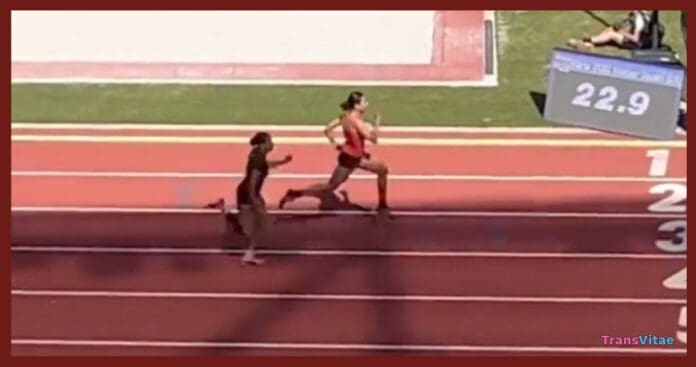In a moment that should have been a celebration of athletic prowess, Aayden Gallagher, a transgender sophomore from McDaniel High School, faced a storm of controversy and boos after clinching the girls’ 200-meter state title at the Oregon School Activities Association (OSAA) track-and-field championship. The event, held at Hayward Field at the University of Oregon, became a flashpoint in the ongoing debate over the inclusion of transgender athletes in girls’ and women’s sports.
Aster Jones, a sophomore at Roosevelt High School, finished in 24.02 seconds, just missing out on Gallagher’s victory with a time of 23.82 seconds. Despite the impressive performance, the cheers were marred by boos from the crowd, reflecting a divisive sentiment that has been brewing both in the stands and online.
The OSAA’s policy allows students to compete in sports based on their gender identity, aiming to provide a fair and safe environment for all students. This policy, designed to promote harmony and fair competition, has been in place for years and aligns with Oregon’s anti-discrimination laws. However, Gallagher’s success has reignited discussions on whether these policies ensure a level playing field.
Video footage posted on X (formerly Twitter) shows the stark contrast in reactions as Gallagher crossed the finish line and later stood on the podium. The boos were audible, serving as a painful reminder of the opposition transgender athletes face. All-American swimmer Riley Gaines, a vocal critic of transgender participation in women’s sports, shared the video, highlighting the crowd’s reaction and claiming it reflects a broader dissatisfaction among female athletes.
“Look at the girls on the podium applauding when 2nd place (the rightful winner) is announced. Then watch them when the boys name is announced,” Gaines wrote. “Stop saying girls are OK with this because they aren’t. This is heartbreaking and deeply regressive.”
The Realities of a Transgender Athlete
Amidst the controversy, it’s crucial to remember the personal journey of Aayden Gallagher. Competing as a transgender athlete in high school sports is not just about breaking records; it’s about breaking barriers and challenging societal norms. The boos and online vitriol directed at Gallagher underscore the broader challenges faced by transgender individuals, particularly in competitive sports.
Gallagher did not break any rules. She competed in accordance with OSAA’s inclusive policy, which reflects Oregon’s commitment to non-discrimination. Yet, the negative reactions from some spectators and public figures reveal a deeper issue: the need for empathy and understanding in the face of progress.
A mother of one of the female runners expressed her frustration, claiming that her daughter’s chances were unfairly impacted. “My daughter is in her senior year, and she has to compete against Aayden, who just won first at state and took away spots from our girls, and he doesn’t deserve it,” she said in an interview with The Publica.
Such statements, while reflecting genuine concerns, also highlight a critical need for education and dialogue about gender identity and inclusivity in sports. The path to acceptance is paved with understanding and compassion, not division and exclusion.
The OSAA’s executive director, Peter Weber, defended the organization’s policy, emphasizing Oregon’s long-standing prohibition against discrimination based on sexual orientation and gender identity. “In 2019, the Oregon Department of Education amended its rules that ‘sexual orientation’ was defined to include ‘gender identity,’” Weber wrote. “The Oregon legislature likewise amended the definition of ‘sexual orientation’ to include ‘gender identity.’”
These legal frameworks are designed to ensure that all students, regardless of their gender identity, have the opportunity to participate in interscholastic activities. However, the backlash that athletes like Gallagher have experienced demonstrates that policies alone are insufficient. There must be a cultural shift towards greater acceptance and support for transgender athletes.
The controversy surrounding Gallagher’s win is a stark reminder of the work that remains to be done. It calls on all of us—athletes, coaches, parents, and allies—to foster an environment where every athlete can compete without fear of discrimination or backlash.
The Bottom Line
Aayden Gallagher’s story is not just about a race won or lost; it’s about the broader fight for equality and respect. It’s about recognizing the courage it takes to be oneself in the face of adversity and the importance of standing up for what is right.
As we reflect on this incident, let us not focus solely on the boos that echoed through Hayward Field, but on the resilience and determination of a young athlete who dared to compete. Let us channel our energies into creating a world where every athlete, regardless of gender identity, is celebrated for their hard work and dedication.
The path to true inclusivity in sports is a marathon, not a sprint. And with each step forward, we move closer to a future where every athlete can cross the finish line to cheers, not jeers.


